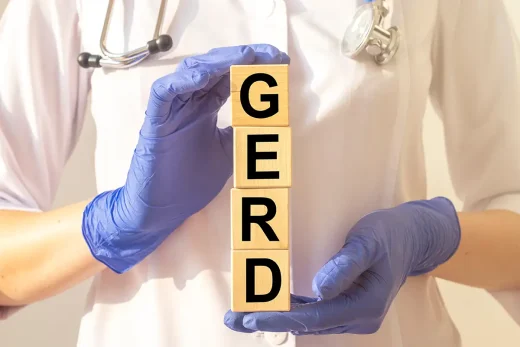GERD Reflux in Turkey
Say Goodbye to Acid Reflux, Say Hello to Freedom.
What is GERD Reflux?
Gastroesophageal reflux disease, commonly known as GERD reflux, is a chronic medical condition that affects the lower esophagus. It occurs when stomach acid or bile flows back into the esophagus, leading to a range of uncomfortable and sometimes severe symptoms. GERD reflux is not to be confused with occasional heartburn; it's a persistent condition that requires careful management.
GERD reflux is typically characterized by symptoms such as heartburn, regurgitation, chest pain, and difficulty swallowing. This condition can significantly impact one's quality of life and may lead to complications if left untreated. Understanding GERD reflux is the first step in effectively managing this condition and improving your overall well-being.

How is Reflux Diagnosed?
Diagnosing GERD reflux involves a combination of clinical evaluation and diagnostic tests. Physicians often start by discussing the patient's symptoms and medical history. They may inquire about the frequency and severity of heartburn, regurgitation, and other associated discomforts. In some cases, lifestyle and dietary factors that exacerbate symptoms will be explored.
To confirm the diagnosis and assess the extent of esophageal damage, various diagnostic tests may be performed. The most common of these include endoscopy, pH monitoring, and esophageal manometry. Endoscopy allows the physician to visually examine the esophagus, while pH monitoring and manometry measure acidity levels and esophageal muscle function, respectively.
What Are the Advantages of GERD Reflux Treatment?
GERD reflux treatment offers numerous advantages, primarily centered around symptom relief and the prevention of long-term complications. By effectively managing and treating GERD reflux, individuals can experience:
Symptom Relief: Treatment can alleviate heartburn, regurgitation, chest pain, and other uncomfortable symptoms, significantly improving quality of life.
Reduced Risk of Complications: Long-term GERD reflux can lead to serious complications such as esophagitis, strictures, Barrett’s esophagus, and even esophageal cancer. Appropriate treatment can help prevent these issues.
Improved Quality of Life: With fewer symptoms and complications, individuals can enjoy a better overall quality of life, as they can eat more comfortably, sleep better, and engage in daily activities without the constant discomfort of reflux.
Medication or Surgery Options: Depending on the severity of the condition, patients can explore different treatment options, from medications that reduce acid production to surgical interventions like fundoplication. These choices allow individuals to tailor their treatment to their specific needs.

Before GERD Reflux
Before a GERD reflux diagnosis, individuals often experience a range of discomfort and uncertainty about the cause of their symptoms. The daily challenges of heartburn, regurgitation, and chest pain can take a toll on their overall well-being, affecting their ability to eat, sleep, and enjoy life to the fullest.
Before GERD reflux, life may have been characterized by trying various over-the-counter remedies, avoiding trigger foods, and experiencing ongoing frustration with the persistent nature of the symptoms. This period is often marked by unanswered questions about what is happening and why.
After GERD Reflux
After receiving a GERD reflux diagnosis and implementing a tailored treatment plan, individuals can experience a significant improvement in their quality of life. The symptoms that once plagued them can be managed more effectively, and the uncertainty and discomfort can be minimized.
After GERD reflux, individuals may find themselves enjoying meals without fear of heartburn, sleeping through the night without discomfort, and regaining a sense of normalcy in their daily lives. This period represents a newfound sense of control and relief.
GERD Reflux Healing Process
The healing process for GERD reflux varies from person to person, depending on the severity of the condition and the chosen treatment method. It typically involves a combination of medication, lifestyle modifications, and regular follow-up with healthcare providers.
Medication, such as proton pump inhibitors or H2 blockers, can help reduce stomach acid production. Lifestyle changes, like maintaining a healthy diet, elevating the head of the bed, and avoiding trigger foods, are also crucial in managing the condition. Over time, the esophagus can heal, and symptoms can be minimized or eliminated.
Treatment Process
General
6-8 Weeks
GERD Reflux in Turkey FAQ
GERD reflux is primarily caused by a malfunctioning lower esophageal sphincter, which allows stomach acid to flow back into the esophagus.
For some individuals, lifestyle changes may be sufficient to manage symptoms. However, others may require medication or surgery. But you should get an appointment to check your reflux.
Avoiding trigger foods like citrus, caffeine, and fatty or spicy items can help reduce symptoms.
GERD reflux is relatively common, affecting millions of people worldwide.
Stress can exacerbate GERD reflux symptoms in some people.
Untreated GERD can lead to complications such as esophagitis, strictures, Barrett's esophagus, and even an increased risk of esophageal cancer.
Contact Us
You can contact us to benefit from the various advantages and advanced health technology of Erdem Hospital, to ask all the questions you have in mind, and to benefit from our treatments.
Start to complete the form, let us reach you!
After you filled out the form, our health consultants will get touch in with you to understand your demands.
Please send your photos to health consultants, our doctors check them.
After all the processes are completed, your treatment will be planned according to the date you are available.